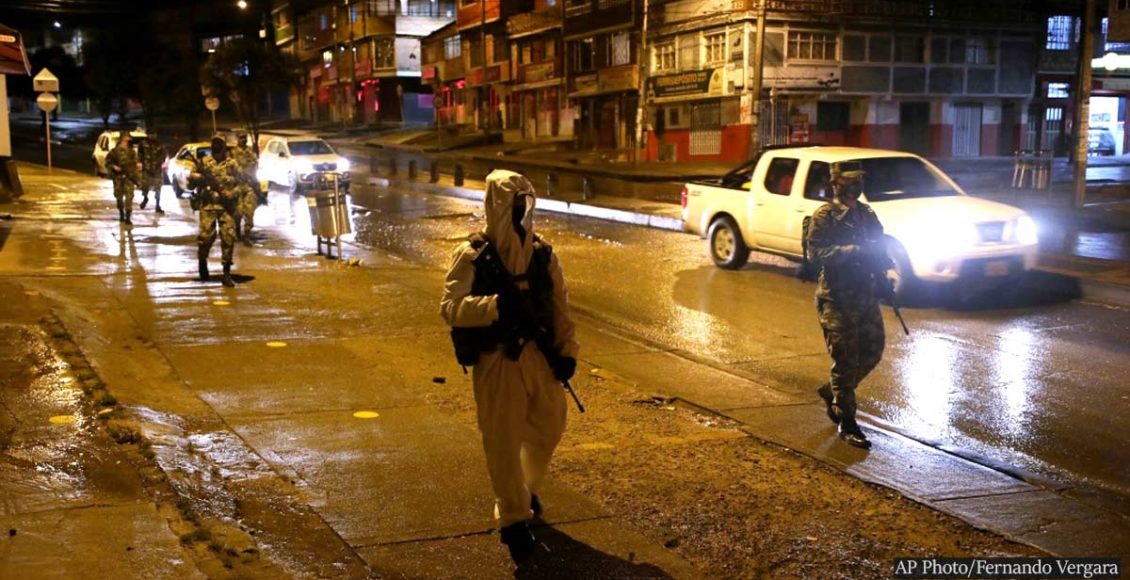Outlaws in Columbia, have started to impose strict coronavirus quarantines on part of the country where authorities have a weak presence, threatening and even executing people who do not abide by the rules, Human Rights Watch warned recently.
A minimum of 9 people have been killed in the last few months for either refusing to follow the guidelines or actively going against them.
One person, community leader Edison Leon, was murdered last month after sending an alert to local authorities that a group called “La Mafia” were forcing locals to staff a health checkpoint in Putumayo.
“I am not willing to continue sending my people to death,” he wrote.
Shortly after his life was taken.
“Draconian ‘punishments’ imposed by armed groups to prevent the spread of COVID-19 mean that people in remote and impoverished communities across Colombia risk being attacked and even killed if they leave their homes,” said Jose Miguel Vivanco, America’s director for Human Rights Watch.
According to Vivanco, the mafia men – some of whom are from the former Revolutionary Armed Forces of Columbia and the National Liberation Army – are using the crisis to impose their control and gain power over the people – but also acting out of fear of COVID-19 itself.
Many places where such groups operate do not have access to hospitals equipped with the proper tools to care for the dangerously ill.
“There is a genuine fear of an outbreak within their ranks,” Vivanco said.
Infections have steadily been on the rise in Colombia, with 173,206 as of Friday.
The country is facing the crisis simultaneously with a number of other problems, which include drug trafficking, massive coca production, and the murders of social leaders and ex-guerrillas in the aftermath of Colombia’s 2016 peace accord.
The country’s unemployment rate is currently at around 21% and experts estimate that 4.7 million citizens will sink into poverty by the end of 2020.
An investigation by Human Rights Watch found that illegal groups carrying arms are enforcing rules to stop the spread of the virus in at least 11 of the country’s 32 states. In about 5 of them, they are resorting to violence to stomp out any resistance. The warnings are spread to the population via paper pamphlets or WhatsApp messages.
One such pamphlet said that fighters have been “forced to kill people in order to preserve lives” and warned only people working in food shops, bakeries, and pharmacies are allowed to be out.
In one instance, three citizens were murdered and four badly injured in southwestern Columbia after being shot while in a public park. In another case, two Venezuelans were killed in cold blood for having a drink at a mobile phone repair shop.
In both cases, prosecutors and humanitarians believe people were murdered for breaking quarantine rules.
In an interview for The Guardian, one community leader in Putumayo said:
“They have shut down transport between villages, and when someone is suspected to have Covid-19 they are told to leave the region or they will be killed.
“And people have no choice but to obey because they never see the government here.”
Even though a lot of Columbia’s crime indicators have been falling in Columbia as well as in other parts of South America during the crisis, violence against many defenseless communities has continued.
The quarantines being enforced by outlaws are even stricter than those imposed by the state, according to Human Rights Watch.
Whereas the country-wide quarantine permits people to leave their homes to seek medical care, some outlaw groups refuse even that.
The Human Rights Watch is now calling on the government to shield civilians from harm and ensure their access to food, drinking water, and health care.
“This abusive social control reflects the government’s long-standing failure to establish a meaningful state presence in remote areas of the country, including to protect at-risk populations,” Vivanco added.
What are your thoughts on this shocking story? Let us know by joining the conversation in the comments and please share this article if you’ve found it informative.


